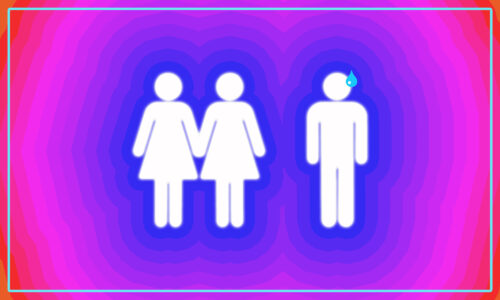China’s complicated relationship with LGBTQ+ rights
Earlier this month, China's do-everything app (which is also a leading social media platform) WeChat permanently suspended the official accounts of more than a dozen LGBTQ+ campus advocacy groups. The move was part of the Chinese state's tightening grip over civil society, but also indicative of a rising backlash toward LGBTQ+ rights within the general population.

Post-1949 China has long had a mixed relationship with the LGBTQ+ movement and -identifying individuals. During the Cultural Revolution, homosexuals were heavily persecuted and castigated as “ill,” “undesirable,” and “disgraceful.” There were relaxations in sociocultural norms during the reform and opening up era, yet even then, men caught having sex with each other could be prosecuted under the Hooliganism Law (流氓罪 liúmáng zuì) until 1997.
But over the final years of the 20th century and the first decade and a half of the 21st, the LGBTQ+ movement made significant headway in legal terms, scoring substantial wins with both national and local court rulings that enabled de facto recognition of the rights of same-sex couples, and trans and other non-binary-conforming individuals. Such progress has not been without its setbacks, of course.
In 1997, homosexuality was officially decriminalized in China. In 2001, homosexuality was removed from the official list of mental disorders, curated by the Chinese Society of Psychiatry — though textbooks portraying homosexuality as a mental disorder to be treated through conversion therapy remain in circulation to this day. A recent ruling by a Jiangsu court upheld the view that a university textbook portraying homosexuality as a “mental disorder” had not committed a factual error — such characterization was merely the result of “perceptual differences.”
Gay marriage remains legally unrecognized in both Hong Kong and the mainland. While sex reassignment surgery has been nominally legalized, it remains largely inaccessible. The successes of Jīn Xīng 金星, a prominent trans dancer, actress, and artist, have served as a vital exemplar and rebuke of the warped narrative that trans individuals are deviant or abnormal, though her achievements and accomplishments stand out conspicuously as the exception as opposed to the norm. Bullying and harassment of trans individuals remain a perennial, endemic issue in families, workplaces, schools, and universities.
Generally speaking, however, the positives outweighed the negatives during this period. According to sociologist and LGBT+ advocate Pān Suímíng’s 潘绥铭 research, in 2006, 52.2% of surveyed respondents disagreed with the statement, “Homosexuals should be completely equal to other people,” a percentage that declined to 28.3% by 2015. The percentage of individuals reporting a “strong desire to have sexual relations with someone of the same sex” increased from 1.3% in 2000 to 5.1% in 2015.
Indeed, the progressively liberal stances of the country’s population was even tacitly echoed and tolerated by the Chinese state.
For over a decade, the annual Pride parade took place in Shanghai, attracting a sizable population from within the country, but also across Asia. Shanghai was also the site of China’s first officially recognized gay bars, such as Eddy’s and Erdingmu. In 2005, Fudan University established a LGBTQ+ studies program, a first amongst Chinese universities. In 2015, the “Shanghai LGBT Tourism Week” attracted over 30,000 tourists to the city.
Elsewhere, campus activist groups in relation to the cause gradually came into existence, spearheading causes ranging from same-sex marriage to unisex and gender-neutral toilets, more funding allocated toward tackling anti-LGBTQ+ violence and hate speech, and transformation of university curricula. Students from universities across major cities — including Shenzhen, Guangzhou, and Beijing — took to local and national social media to promulgate LGBTQ+ issues and consciousness-raising, shedding light on demographics that had hitherto been invisible.
State censors viewed such activism as non-inimical to social order and stability. Indeed, the state-affiliated tabloid Global Times even published an op-ed that openly acknowledged the existence of “BL culture” (Boys’ Love), a trend described as where “fans imagine homoerotic relationships between male characters, fictional or otherwise.” The Chinese public was opening up to sexual diversity — and, for a while at least, the state appeared willing to concede to such changes.

Much of this has changed over the past five years. In February 2016, the Chinese gay series Heroin (known in Chinese as Addicted, 上瘾 shàngyǐn) was banned from broadcasting online. In 2018, Sina Weibo declared a ban on all LGBT-related issues — though the state-owned Party newspaper People’s Daily came to the defense of individual citizens, offering a glimpse into the inconsistent and contradictory stances on the matter within the state apparatus. State censors also barred the Beijing International Film Festival from screening Call Me by Your Name, the Oscar-winning movie revolving around a same-sex couple.
Shanghai Pride was halted last year, ostensibly due to the COVID-19 pandemic, though some suspect the suspension was for different reasons (the country had managed to contain the pandemic by mid-2020). It remains unclear if Shanghai Pride or any other large-scale pride events in the country will be held in the foreseeable future.
One may be tempted to view the backlash toward LGBTQ+ content and viewpoints as entirely state-driven, yet this would be an oversimplification. Several prominent Weibo influencers took to gloating over the government’s recent censure of campus LGBTQ+ groups, with blogger Zǐwǔxiáshì 子午侠士 declaring that they were “so glad that the government is finally taking some action on the LGBT organizations.” Elsewhere, conservative, reactionary voices have celebrated the elimination of what they deem to be the perversion and distortion of established sexual norms and family values.
Many more have come to associate the movement with perceived foreign interference and Western meddling in China’s “domestic affairs” — a motif oft-recycled by official sources and leading media figures alike in castigating ideals deemed to be “Western” or “anti-Chinese.” The argument that LGBT+ rights were antithetical to Chinese values — once dormant — has once again been trotted out as a means of containing the movement’s spread. Such rhetoric has been tacitly encouraged by certain state actors, who fear that the increasing connections fomented between local pro-equality NGOs and their international counterparts could well pose a threat to the ruling party’s continued grip over power. Such worries are arguably overstated and overblown — many leading LGBTQ+ groups have worked closely with official state organs; indeed, many campus activist groups are sponsored and monitored by the official administrations of the country’s leading universities.
All of this is to say that the recent crackdown on LGBTQ+ activism from university students should not be all that surprising. Yet it remains significant, for two distinctive reasons: first, it reflects a systemic and structured attempt on the part of state-affiliated actors to constrict the speech and advocacy of student organizations (as opposed to pan-society, off-campus organizations at large). This, in turn, reflects a growing uneasiness and discomfort toward even civil society groups that are easily monitored and experience constant surveillance (students remain fundamentally attached to their campuses). The heightened paranoia is palpable.
Second, the blanket ban on student involvement reflects the more deeply embedded intentions on the government’s part to restrict the level of pro-LGBTQ+ discourse in the education system. The ambivalence of textbooks and formal curricula in the 2000s and early 2010s has been supplanted by a decisive insistence that LGBTQ+ rights has no place in the classroom. The latest ban has only amplified this message.
With that said, such a move must also be read in light of Beijing’s persistent yearning for exerting absolute control and ensuring compliance from civil society actors, especially on the front of non-governmental organizations (NGO). Over recent years, the Chinese state has renewed its long-standing animosity and grievances toward non-state actors — as prospective hotbeds for insurgent, political activity. The 2017 Foreign NGO Law mandated that foreign NGOs register with the Ministry of Public Security prior to establishing an office within the mainland. More recently, the state has ramped up its restrictions and regulations of NGOs in the run-up to the party’s centennial anniversary. The mobilizing potential and uncontrollability of independent NGOs amounts to an active threat to the regime’s quest for certainty and manageability in society. Thus, the extent to which the Chinese state is inherently anti-LGBTQ+ should be carefully considered, and not blown out of proportion: it is less about normative principles and more about political control and power.

The path ahead for the LGBTQ+ community — activists, academics, professionals, and ordinary citizens alike — remains rocky and uncertain. The primary cause for hope, as touted by Cheng Li in his book Middle Class Shanghai, has always been China’s increasing interconnectivity and civil society exchange with the world at large, which has culminated in the rise of more progressive, liberal, and liberated attitudes on sex, personal autonomy, and gender identities across cosmopolitan cities. Yet such changes must also be juxtaposed against the fervent, anti-Western sentiments steering a growing backlash toward LGBTQ+ activists in the countryside and amongst the urban poor, who have found solace in the blend of hyper-nationalism and conservatism advanced by public intellectuals and media personalities.
It would be foolish to reduce the increasingly polarized views in Chinese civil society to a simplistic “urban vs. rural” divide — within college campuses and the city there exists a heterogeneous mixture of views on LGBTQ+ issues, marked by vitriolic and vociferous clashes over the “correct” set of values by which China should be governed and citizens should abide. Civil society is as divided over LGBTQ+ rights — if not more so — than the Chinese state. For the movement, this means there are more challenges than ever.





